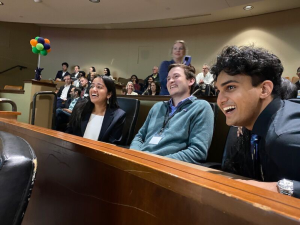
The following was written by Joseph Choy, FastForward U’s communications intern.
Spring 2023 has been filled with exciting travel, achievements and awards for our student ventures here at FastForward U. As summer begins, we want to showcase what our founders have been up to.
MagGenix is a startup aiming to direct and locally activate CAR-T cells into solid tumors by using magnetic fields to modulate the therapeutic cells. The team, headed by Josh Devier, won a $25,000 prize at the Baylor New Venture Competition, the Fuel Demo Day Audience Choice award, and a Summer Medtech Award at the annual 2023 Innovation & Entrepreneurship Challenge. “We’re excited to use our funds to keep pushing our research and development efforts,” says Devier. “One key experience for us was going through the I-Corps program, where we were able to reach out to industry leaders in the cell therapy space. Being able to conduct this invaluable market research allowed us to guide our business plan to solve the biggest issue in the space, which is the safety of current CAR-T therapies.”
Founded by Sneha Batheja, OnPoint Ventilation is a medical device technology startup that is building a novel catheter to improve one-lung ventilation surgery. The venture won first place at the e-Fest Schulze Entrepreneurship Challenge and a $25,000 StAAR Transformative Award from Johns Hopkins Medicine this spring.

OnPoint Ventilation team members Sneha Batheja, Charlie Almoney and Arijit Nukala
“The funds we won make this an exciting time for OnPoint Ventilation,” says Batheja. “It allows us to continue our device development by having medical grade prototypes made, leading us to conduct more validation and testing in preclinical porcine models.”
MiraHeart
MiraHeart is a venture founded by Bhavya Gopinath, Sam Dasari, Carter Gaulke and Sunny Patel, aiming to provide a noninvasive at-home method of monitoring early signs of pediatric heart failure. The team participated in the Rice Business Plan Competition (RBPC) and won the $25,000 Pediatric Device Prize by the Southwest National Pediatric Device Innovation Consortium (SWPDC). The prize was supported in partnership with the SWPDC at Texas Children’s Hospital and Baylor College of Medicine. MiraHeart also won third overall at the Heartland Challenge at the University of Arkansas, Audience Choice Award for Spark Demo Day, Second Place at HopStart and Second Place at the Delaware Startup302 competition. Gopinath reflects on the team’s experience at RBPC:
“Going into the competition, I think all of us were just really excited to network, meet potential investors and experts in the medical device space, as well as to interact with the other invited startups to hear about their experiences. We are a relatively early-stage venture, so hearing any advice that we can get from fellow peers who have gone through a similar process in forming startups is always very valuable. Houston is also home to the SWPDC, and we were lucky enough to both speak with them earlier in the year and interact with them at RBPC. The SWPDC is an example of a resource that is now only available in the pediatric space to help with clinical trials and regulatory consultations. Speaking with the SWPDC about other pediatric ventures under their portfolio was also really inspiring, and makes me excited and motivated to keep innovating for pediatrics, an underserved but important population.”
Antony Fuleihan and Evan Haas’ venture, CurveAssure, is personalizing spine care for patients based on their physiology. The pair has had tremendous success, recently winning first place in the Stu Clark New Venture Challenge’s Business Plan and Elevator Pitch competitions, first place in the Carey Student Showcase, and the Audience Choice award at Nucleate Baltimore’s Activator program Final Pitch showcase. CurveAssure was also selected as one of two ventures selected to receive the inaugural Johns Hopkins University President’s Venture Fellowship.
Reflecting on this, Fuleihan attributes the principles he learned through the Johns Hopkins Center for Bioengineering Innovation and Design and how they helped him co-found his startup: “Central to the biodesign process is understanding the clinical environment and the perspectives of all stakeholders. We have conducted over 150 interviews with clinicians, patients and business leaders in the field, in addition to observing over 100 spinal procedures. These experiences have given us critical insights needed to design a solution to address previously unmet patient needs. The technical and clinical expertise we’ve leveraged, along with our mentors at FastForward U, are key reasons why we’ve been able to pitch a complex issue in a clear and relatable fashion.”